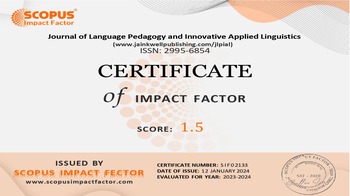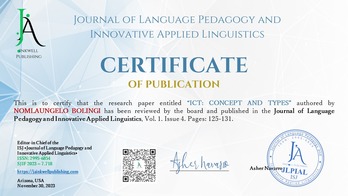Exploring Pedagogical Strategies: Tailored Techniques for Assessing Children's Developmental Capacities
DOI:
https://doi.org/10.1997/mebbwf22Keywords:
correctional education system, children with disabilities, zone of proximal development, principles of formative experiment, case assignments for studentsAbstract
The article proposes methods for assessing and research methods for the zone of proximal development in children with disabilities. The system of work of the Department of Innovative Educational Technologies and Educational Pedagogy for preparing students to use assessment methods and methods for studying the zone of proximal development when organizing work with children with disabilities is presented.
Downloads
References
Vygotsky, L. S. (1978). Mind in Society: The Development of Higher Psychological Processes. Harvard University Press.
Bruner, J. S. (1986). Actual Minds, Possible Worlds. Harvard University Press.
Rogoff, B. (1990). Apprenticeship in Thinking: Cognitive Development in Social Context. Oxford University Press.
Wood, D., Bruner, J. S., & Ross, G. (1976). The Role of Tutoring in Problem Solving. Journal of Child Psychology and Psychiatry, 17(2), 89-100.
Tharp, R. G., & Gallimore, R. (1988). Rousing Minds to Life: Teaching, Learning, and Schooling in Social Context. Cambridge University Press.
Feuerstein, R., Rand, Y., & Hoffman, M. B. (1979). The Dynamic Assessment of Retarded Performers: The Learning Potential Assessment Device, Theory, Instruments, and Techniques. University Park Press.
Palincsar, A. S., & Brown, A. L. (1984). Reciprocal Teaching of Comprehension-Fostering and Comprehension-Monitoring Activities. Cognition and Instruction, 1(2), 117-175.
Lantolf, J. P., & Thorne, S. L. (2006). Sociocultural Theory and the Genesis of Second Language Development. Oxford University Press.
Krashen, S. (1982). Principles and Practice in Second Language Acquisition. Pergamon Press.
Cohen, L., Manion, L., & Morrison, K. (2017). Research Methods in Education. Routledge.
Насруллаев, Ж. Р. (2019). Осуществление коммуникативной деятельности на занятиях по чтению англоязычных текстов. In Пятый международный интеллектуальный форум" Чтение на евразийском перекрестке" (pp. 405-409).
Насруллаев, Ж. Р. (2019). Значение культурного и духовного наследия узбекского народа в мировых собраниях. In Культурные инициативы (pp. 72-73).
Ismailov, A. R., & Nasrullaev, J. R. Modern methods of teaching foreign languages. Ученый XXI века, 46.
Ismailov, A. R., & Nasrullaev, J. R. Principles of the methodology for oral speech. Ученый XXI века, 60.
Сулейманова, Н. М., & Насруллаев, Ж. Р. (2018). Some aspects of cognitive linguistics, including pragmatic factors. In Современные исследования и перспективные направления инновационного развития науки (pp. 58-60).
Downloads
Published
Issue
Section
License
Copyright (c) 2023 Zulfizar Rakhimova, Zarnigor Bahriddinova (Author)

This work is licensed under a Creative Commons Attribution 4.0 International License.












